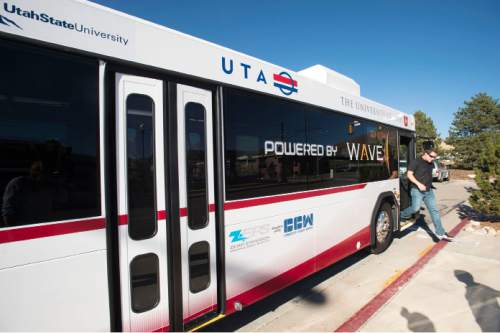This is an archived article that was published on sltrib.com in 2016, and information in the article may be outdated. It is provided only for personal research purposes and may not be reprinted.
City attorneys in Provo and Orem say state law does not allow a proposed referendum to block a controversial transit project there — but they must wait to reject it officially until after groups finish gathering signatures for that ballot measure.
Despite the warning, "We plan on going forward to collect our signatures," said Jennifer Baptista, who is heading an Orem group opposed to a bus rapid transit (BRT) project. "At the same time, we are looking into our legal options."
Meanwhile, officials say the petitions will not slow plans to begin the BRT project this summer.
Groups are upset by votes on April 26 by the Provo and Orem city councils to give 50-year, no-cost leases to the Utah Transit Authority to use some city streets for bus-only lanes and space needed for BRT stations. Critics say the $190 million project is not needed, too expensive and will slow other traffic.
State law allows residents to overturn new city ordinances if they can gather enough signatures within 45 days of passage to put a referendum on the ballot. A majority of city voters is then needed to approve that action.
But both city attorneys wrote to their city recorders that the lease approval was administrative, not legislative, so state law does not allow challenging that on the ballot.
"Authorizing the mayor to sign agreements is an administrative act. Actually signing the agreements is also an administrative act," Orem City Attorney Greg Stephens wrote.
Similarly, Provo City Attorney Robert West wrote the action in Provo "was not a lawmaking or legislative act," but "instead is administrative in nature." He also said state law prevents challenging interlocal agreements by referendum.
Attorneys told their city recorders to wait to reject petitions as legally insufficient until after they are returned. Both said a Utah Supreme Court ruling prevents cities from blocking signature gathering by making such rulings in advance.
"Therefore, I recommend that you allow the petitioners to circulate their referendum packets, but give them notice of the city's concern … and the city's likely rejection of a completed referendum petition," Stephens wrote.
Baptista said while petition groups in Orem and Provo are working separately to collect signatures, "we're working together to try to figure out our legal options."
She adds she's convinced that opinions by the city attorneys are wrong, and likely will challenge them. "What we are asking for and what we are doing is legal," she said.
The petitions, if successful, would not put the question before voters until 2017 — long after the project is scheduled to begin this summer. But if it qualifies for the ballot, Baptista believes that should force UTA and partners to hold off on portions of the project affected by the leases.
Provo spokesman Corey Norman, speaking also for UTA and other partners in the project, said the project will go forward despite the petitions.
He said even if the lease agreements were somehow nullified, "that does not stop the project" since it mainly would use state highways, such as University Avenue and University Parkway.
All that nullification would do "is make the project less efficient, meaning that UTA will not make the improvements that we carefully negotiated over the last two years," he said. "The enhancements will go away, the dedicated lanes [on city streets] will go away, but the project will continue to go forward."
BRT would have extra-long buses travel along bus-only lanes for about half of their 10.5-mile Provo-Orem route. Passengers would buy tickets from machines before boarding, and buses would have extra doors to speed entry. Buses may receive priority at traffic signals, and they will arrive about every six minutes at peak times.
BRT is scheduled to start operation in spring 2018. It will operate on major roads such as University Parkway and University Avenue to connect FrontRunner stations in Provo and Orem via Utah Valley University, University Mall, Brigham Young University, downtown Provo and the Provo Towne Centre mall.



